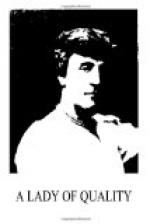“Sure God forgives,” she breathed—“for Christ’s sake. He would not give this little tender thing a punishment to bear.”
CHAPTER XXII—Mother Anne
There was no punishment. The tender little creature grew as a blossom grows from bud to fairest bloom. His mother flowered as he, and spent her days in noble cherishing of him and tender care. Such motherhood and wifehood as were hers were as fair statues raised to Nature’s self.
“Once I thought that I was under ban,” she said to her lord in one of their sweetest hours; “but I have been given love and a life, and so I know it cannot be. Do I fill all your being, Gerald?”
“All, all!” he cried, “my sweet, sweet woman.”
“Leave I no longing unfulfilled, no duty undone, to you, dear love, to the world, to human suffering I might aid? I pray Christ with all passionate humbleness that I may not.”
“He grants your prayer,” he answered, his eyes moist with worshipping tenderness.
“And this white soul given to me from the outer bounds we know not—it has no stain; and the little human body it wakened to life in—think you that Christ will help me to fold them in love high and pure enough, and teach the human body to do honour to its soul? ’Tis not monkish scorn of itself that I would teach the body; it is so beautiful and noble a thing, and so full of the power of joy. Surely That which made it—in His own image—would not that it should despise itself and its own wonders, but do them reverence, and rejoice in them nobly, knowing all their seasons and their changes, counting not youth folly, and manhood sinful, or age aught but gentle ripeness passing onward? I pray for a great soul, and great wit, and greater power to help this fair human thing to grow, and love, and live.”
These had been born and had rested hid within her when she lay a babe struggling ’neath her dead mother’s corpse. Through the darkness of untaught years they had grown but slowly, being so unfitly and unfairly nourished; but Life’s sun but falling on her, they seemed to strive to fair fruition with her days.
’Twas not mere love she gave her offspring—for she bore others as years passed, until she was the mother of four sons and two girls, children of strength and beauty as noted as her own; she gave them of her constant thought, and an honour of their humanity such as taught them reverence of themselves as of all other human things. Their love for her was such a passion as their father bore her. She was the noblest creature that they knew; her beauty, her great unswerving love, her truth, were things bearing to their child eyes the unchangingness of God’s stars in heaven.
“Why is she not the Queen?” a younger one asked his father once, having been to London and seen the Court. “The Queen is not so beautiful and grand as she, and she could so well reign over the people. She is always just and honourable, and fears nothing.”




